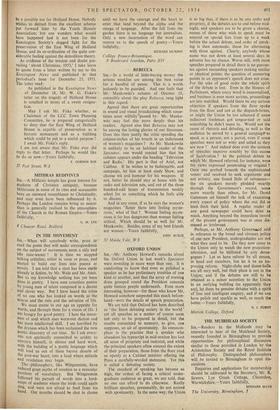OXFORD UNION SIR,—Mr. Anthony Howard's remarks about the Oxford Union
in last week's Spectator were revealing in more ways than one. It is comforting to know that even so polished a speaker as he has preliminary troubles of one kind or another, and that the array of evening dress grouped round the President conceals quite human people underneath. Even more interesting, however—for those who know Mr. Howard somehow suspected this much before- hand—were the details of speech preparation.
We arc told that Oxford has been described as the finest debating society in the world' yet all speeches as a matter of course seem not only to be prepared in detail, but the results committed to memory, to give, one supposes, an air of spontaneity. So common- place is the practice that a speaker who abandons his typescript in mid-oration has lost all sense of propriety and restraint, and while the principal speakers often conceal the extent of their preparation, those from the floor read as openly as a Cabinet minister offering the Press a carefully-worded statement. Yet this is called a debating society.
The standard of speaking has become so high, the ordeal of facing a critical under- graduate audience so great, we are told, that no one can afford to do otherwise. Really brilliant speeches, presumably, do not accord with spontaneity. In the same way, the Union
is so big that, if there is to be any order and propriety, if the debates are to end before mid- night, and speakers are to be given a chance, names of those who wish to speak must be entered on special lists from up to a week before the actual debate, and order of speak- ing is then automatic, those for alternating with those against. Clearly, anybody whose name was not down at least several days in advance has no chance. Worse still, with most speeches prepared in detail there is no guaran- tee against succeeding speakers making similar or identical points; the question of answering points in an opponent's speech does not arise. For the sake of good order the whole spirit of the debate is lost. Even in the Houses of Parliament, where every word is immortalised, and business is even more serious, proceedings are less stultified. Would there he any serious objection if speakers from the floor spoke from the floor and not at the dispatch-boxes, or might the Union be too ashamed if some indiscreet freshman got tongue-tied or said something he didn't mean to. Would not the cause of rhetoric and debating, as well as the audience be served by a general campaign-to speak as a person, not a parrot, even if some speeches were not so witty and salted as they are now ? And indeed does even the content of speeches improve notably by this excess of lucubration ? In the political debate to which Mr. Howard referred, for instance, were the views expressed penetrating or original Once one probed beneath the sophisticated veneer and resolved to seek arguments and not artistry, one found little of substance— the six speakers merely plodded wearily through the Government's record, some more wearily than others, for Mr. David Gammans set himself the task of examining every aspect of policy where the rest did at least limit their field. A regular reader of any good newspaper could have done as much. Anything beyond the immediate record of the present government was at once dis- missed as irrelevant.
Perhaps, as Mr. Anthony Greenwood said in reference to the bread and circuses policy of our new President, undergraduates are not what they used to be. Do they now come to the Union only to watch the new projection- television, and be titillated by arty dema- gogues ? Let us have reform by all means, in head and members, but let it be an im- proving reform. Night-clubs and dance-halls are all very well, but their place is not in the Union; and if the debates are still to be retained as a minor accretion to the Union in an outlying building (as apparently they are), let them be genuine debates with a spirit of free and intelligent enquiry, and if we can have polish and sparkle as well, so much the better.—Yours faithfully,


































 Previous page
Previous page